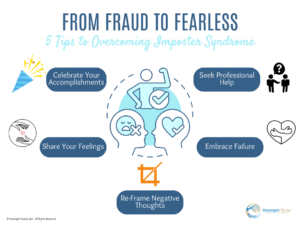
Are you a leader who worries about being a fraud or an imposter? Are you constantly battling with the fear of being exposed as a fake and not deserving of your accomplishments? If yes, then you are not alone. This is a common issue especially faced by leaders called imposter syndrome.
Imposter syndrome is a term that was coined by psychologists Pauline Clance and Suzanne Imes in 1978. It is commonly understood as a psychological pattern of self-doubt where an individual doubts their abilities and accomplishments despite evidence of their success. Individuals with imposter syndrome often feel like they are frauds and don’t deserve their achievements.
Imposter syndrome is a phenomenon that affects successful people across all industries. It’s estimated that approximately 70% of people experience these feelings of unworthiness at some point in their lives.
A common factor among people with imposter syndrome is that they set unrealistic expectations for themselves and fear that they will not be able to meet those expectations. They berate themselves for not being good enough and compare their achievements to others, leading to feelings of inadequacy.
Leaders are not immune to imposter syndrome. In fact, they are more prone to experiencing it as they are constantly in the limelight and have to make difficult decisions. They are expected to have all the answers, be confident, and lead their team to success. This pressure can lead to feeling like an imposter.
Leaders who are affected by imposter syndrome can find it challenging to take credit for their achievements, leading to a lack of self-confidence and difficulty in leading teams. They may struggle with accepting praise and recognition, thereby hindering their growth potential.

Get Your copy of the quick reference “From Fraud to Fearless” Tip Sheet! Empower yourself by keeping these tips handy to break free from imposter syndrome!
Overcoming Imposter Syndrome
To overcome imposter syndrome, leaders must learn to recognize and acknowledge the emotions behind their self-doubt. They can use the following tips to help them overcome their fear of being a fraud:
1. Celebrate Your Accomplishments: Instead of obsessing over the next challenge, take time to celebrate your achievements. Recognize your accomplishments and praise yourself for the hard work you’ve put in.
2. Share Your Feelings: It’s human to feel like an imposter. Sharing your feelings with a trusted colleague or mentor can be helpful. They can provide encouragement, support, and an objective perspective.
3. Reframe Negative Thoughts: Be mindful of your self-talk and reframe any negative thoughts that arise. Focus on your strengths and recognize the progress you have made.
4. Embrace Failure: Everyone makes mistakes, and failure is an essential part of growth. Embrace the lessons learned from setbacks and use them to improve your skills.
5. Seek Professional Help: People with severe imposter syndrome may benefit from seeking professional help from a therapist or coach. They can provide an objective perspective and help individuals work through their emotions.
In conclusion, imposter syndrome is a common phenomenon that affects all of us, including and especially leaders. By recognizing these feelings of self-doubt and taking steps to overcome them, leaders can lead with confidence and inspire their teams to succeed. Remember to celebrate your success, and that failure is not a reflection of your worth.
If you enjoyed this blog post and found it helpful, be sure to share it using the share links below!
From Fraud to Fearless: 5 Tips to Help Leaders Overcome Imposter Syndrome
August 5, 2023


